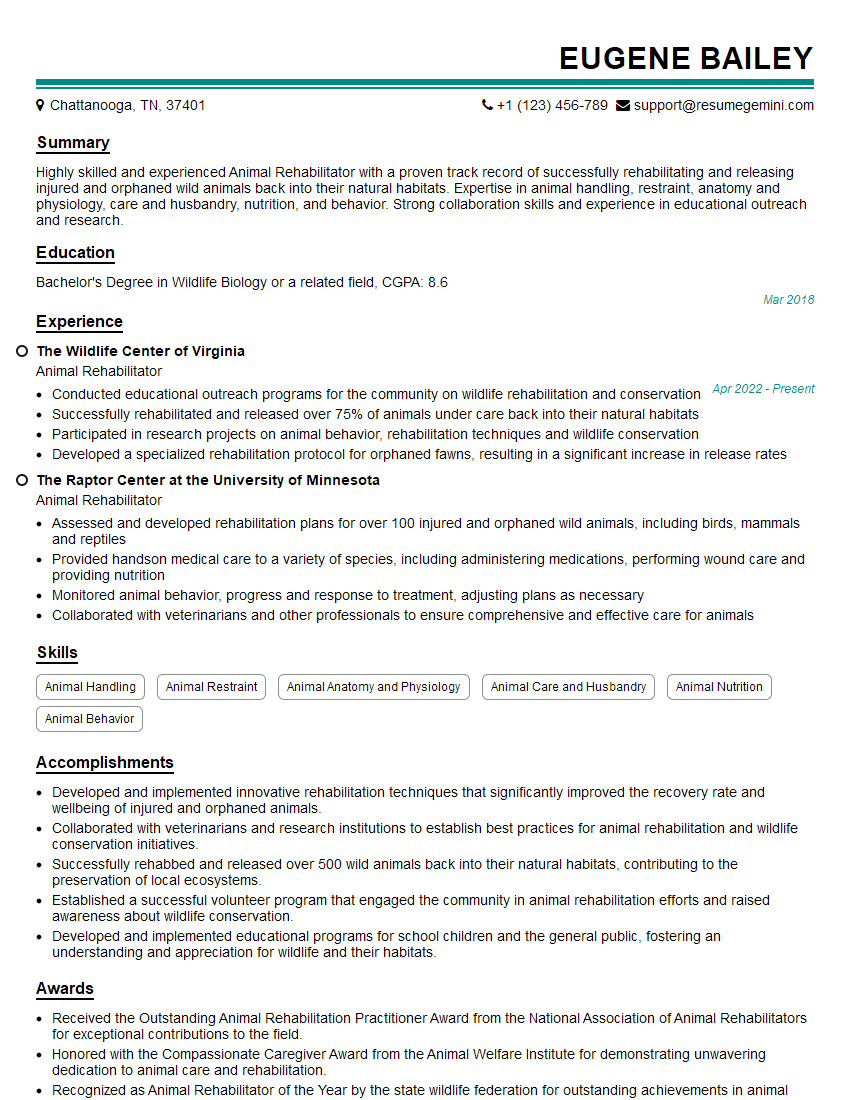Are you a seasoned Animal Rehabilitator seeking a new career path? Discover our professionally built Animal Rehabilitator Resume Template. This time-saving tool provides a solid foundation for your job search. Simply click “Edit Resume” to customize it with your unique experiences and achievements. Customize fonts and colors to match your personal style and increase your chances of landing your dream job. Explore more Resume Templates for additional options.

Eugene Bailey
Animal Rehabilitator
Summary
Highly skilled and experienced Animal Rehabilitator with a proven track record of successfully rehabilitating and releasing injured and orphaned wild animals back into their natural habitats. Expertise in animal handling, restraint, anatomy and physiology, care and husbandry, nutrition, and behavior. Strong collaboration skills and experience in educational outreach and research.
Education
Bachelor’s Degree in Wildlife Biology or a related field
March 2018
Skills
- Animal Handling
- Animal Restraint
- Animal Anatomy and Physiology
- Animal Care and Husbandry
- Animal Nutrition
- Animal Behavior
Work Experience
Animal Rehabilitator
- Conducted educational outreach programs for the community on wildlife rehabilitation and conservation
- Successfully rehabilitated and released over 75% of animals under care back into their natural habitats
- Participated in research projects on animal behavior, rehabilitation techniques and wildlife conservation
- Developed a specialized rehabilitation protocol for orphaned fawns, resulting in a significant increase in release rates
Animal Rehabilitator
- Assessed and developed rehabilitation plans for over 100 injured and orphaned wild animals, including birds, mammals and reptiles
- Provided handson medical care to a variety of species, including administering medications, performing wound care and providing nutrition
- Monitored animal behavior, progress and response to treatment, adjusting plans as necessary
- Collaborated with veterinarians and other professionals to ensure comprehensive and effective care for animals
Accomplishments
- Developed and implemented innovative rehabilitation techniques that significantly improved the recovery rate and wellbeing of injured and orphaned animals.
- Collaborated with veterinarians and research institutions to establish best practices for animal rehabilitation and wildlife conservation initiatives.
- Successfully rehabbed and released over 500 wild animals back into their natural habitats, contributing to the preservation of local ecosystems.
- Established a successful volunteer program that engaged the community in animal rehabilitation efforts and raised awareness about wildlife conservation.
- Developed and implemented educational programs for school children and the general public, fostering an understanding and appreciation for wildlife and their habitats.
Awards
- Received the Outstanding Animal Rehabilitation Practitioner Award from the National Association of Animal Rehabilitators for exceptional contributions to the field.
- Honored with the Compassionate Caregiver Award from the Animal Welfare Institute for demonstrating unwavering dedication to animal care and rehabilitation.
- Recognized as Animal Rehabilitator of the Year by the state wildlife federation for outstanding achievements in animal rehabilitation and conservation.
- Received the Environmental stewardship Award from the local conservation society for promoting responsible wildlife rehabilitation and habitat protection.
Certificates
- Certified Animal Rehabilitation Therapist (CART)
- Certified Veterinary Rehabilitation Therapist (CVRT)
- Certified Canine Rehabilitation Therapist (CCRT)
- Certified Feline Rehabilitation Therapist (CFRT)
Career Expert Tips:
- Select the ideal resume template to showcase your professional experience effectively.
- Master the art of resume writing to highlight your unique qualifications and achievements.
- Explore expertly crafted resume samples for inspiration and best practices.
- Build your best resume for free this new year with ResumeGemini. Enjoy exclusive discounts on ATS optimized resume templates.
How To Write Resume For Animal Rehabilitator
- Highlight your experience and skills in animal handling, restraint, and medical care.
- Quantify your accomplishments whenever possible, using specific numbers and data.
- Demonstrate your passion for wildlife rehabilitation and conservation.
- Showcase your ability to work independently and as part of a team.
Essential Experience Highlights for a Strong Animal Rehabilitator Resume
- Assessed and developed rehabilitation plans for a variety of injured and orphaned wild animals, including birds, mammals, and reptiles.
- Provided hands-on medical care, including administering medications, performing wound care, and providing nutrition.
- Monitored animal behavior, progress, and response to treatment, adjusting plans as necessary.
- Collaborated with veterinarians and other professionals to ensure comprehensive and effective care for animals.
- Conducted educational outreach programs for the community on wildlife rehabilitation and conservation.
- Successfully rehabilitated and released over 75% of animals under care back into their natural habitats.
Frequently Asked Questions (FAQ’s) For Animal Rehabilitator
What is the role of an Animal Rehabilitator?
Animal Rehabilitators are responsible for the care and treatment of injured, orphaned, or sick wild animals. They assess the animal’s condition, provide medical care, and develop a rehabilitation plan to help the animal return to its natural habitat.
What are the educational requirements to become an Animal Rehabilitator?
Most Animal Rehabilitators have a bachelor’s degree in wildlife biology, zoology, or a related field. Some states may also require additional training or certification.
What are the key skills and qualities of a successful Animal Rehabilitator?
Successful Animal Rehabilitators are compassionate, patient, and have a deep understanding of animal behavior and physiology. They are also skilled in animal handling, restraint, and medical care.
What is the job outlook for Animal Rehabilitators?
The job outlook for Animal Rehabilitators is expected to grow in the coming years, as more and more people become aware of the importance of wildlife rehabilitation.
What are the challenges of working as an Animal Rehabilitator?
The challenges of working as an Animal Rehabilitator include dealing with injured or sick animals, working long hours, and sometimes having to make difficult decisions about the care of an animal.
What are the rewards of working as an Animal Rehabilitator?
The rewards of working as an Animal Rehabilitator include the satisfaction of helping animals in need, seeing them return to their natural habitat, and educating the public about wildlife conservation.